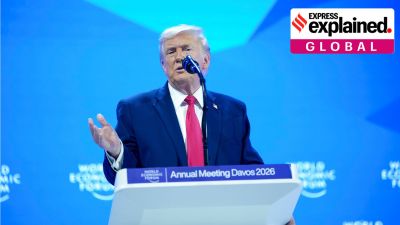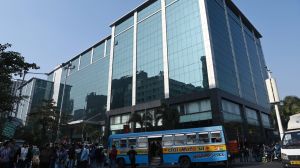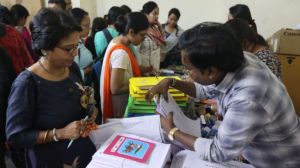Sangathan was his world
Kushabhau Thakre, who died last Saturday, was a grassroot-level 8220;pracharak8221; who rose to become BJP president. Born at Dhar in 1922...

Kushabhau Thakre, who died last Saturday, was a grassroot-level 8220;pracharak8221; who rose to become BJP president. Born at Dhar in 1922, Thakre came from a Chandraseni Kayasth Prabhu family of Maharashtrian-origin. Around the time when he came of age, RSS was fast spreading its influence in the Malwa region of Madhya Bharat. Given his socio-cultural background, it was natural that Thakre came in contact with the initial Marathi-speaking crop of RSS 8220;pracharaks8221; turned out by K.S. Hedgewar.
At 20, Thakre left home to become a 8220;pracharak.8221; He was deputed to the Ujjain, Ratlam and Mandsaur areas. When the RSS decided to set up its political party, Thakre was shifted to the Jana Sangh. He first emerged as the principal organiser of the party in Malwa and was two years later, shifted to Bhopal as organising secretary.
The new role saw the best of Thakre. He organised the party up to tehsil level. However, the real challenge lay in penetrating the countryside. Thakre evolved a novel scheme 8212; he came out with the concept of Shakti Kendras. Each kendra was a nucleus for five to six panchayats.
These basic units enabled the Jana Sangh to launch a movement against the Congress move for co-operative farming following the Nagpur Congress resolution in 1959. It was the Jana Sangh8217;s first effort to reach out to the peasantry in MP. The effort paid off and the party emerged as the principal rival to the Congress. Over a decade later, the Jana Sangh endeared itself to the Adivasis by launching an agitation against nationalisation of forests, with Thakre leading a demonstration at Delhi in 1972.
Though Thakre had shifted to the Centre as a national secretary in 1967, he remained cast in the mould of a 8220;pracharak8221; obsessed with MP. As most senior leaders moved to the government in 1998, BJP presidency came Thakre8217;s way. A 8220;pracharak8221; to the bone, poor Thackeray did not know how to cope with the demands of his high-profile office. Used to 8220;baithaks8221; of 8220;karyakartas,8221; he had not known the world beyond 8220;sangathan.8221;
He was dutifully articulating the old Sangh-BJP line of 8216;no-FDI-in-insurance8217;, when he found himself positioned against the latest government view in late 1998. As the party subsequently endorsed the government stand, Thakre appeared to have given in. By turns, he was either seen as toeing a line opposed to Atal Bihari Vajpayee or his deputy L.K. Advani. No wonder, he was not considered for a second term.
Thakre took his marginalisation in his stride. Simple, honest, forthright, he still commanded respect even among the high and mighty in the party, for, unlike them, he had sought nothing from the party. In his last days, he was content meeting party workers in his nondescript room in the backyard of the BJP headquarters. For career politicians, this was the office and for him, home. He lived and died a 8220;pracharak8221; after 61 years of dedicated work.
- 01
- 02
- 03
- 04
- 05































